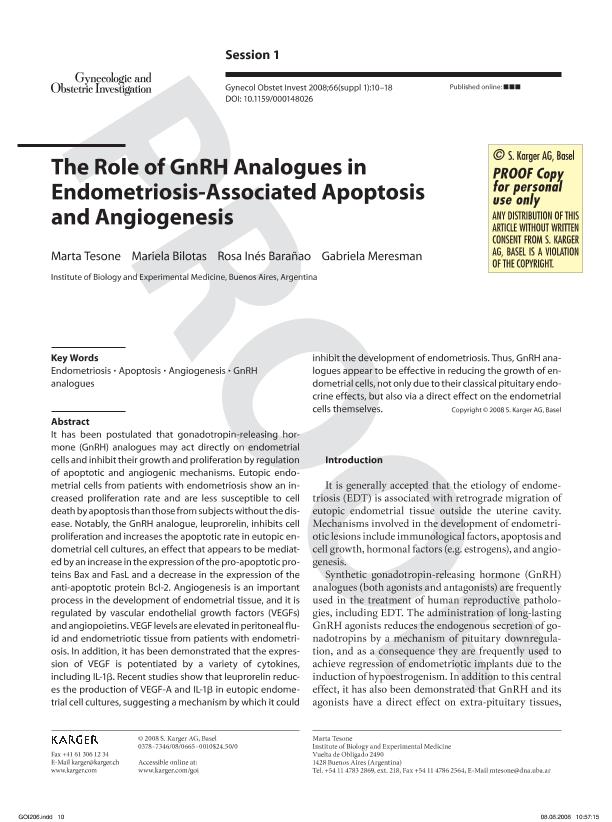Mostrar el registro sencillo del ítem
dc.contributor.author
Tesone, Marta

dc.contributor.author
Bilotas, Mariela Andrea

dc.contributor.author
Barañao, Rosa Ines

dc.contributor.author
Meresman, Gabriela Fabiana

dc.date.available
2017-10-04T18:24:03Z
dc.date.issued
2008-10-18
dc.identifier.citation
Tesone, Marta; Bilotas, Mariela Andrea; Barañao, Rosa Ines; Meresman, Gabriela Fabiana; The Role of GnRH analogues in endometriosis associated apoptosis and angiogenesis; Karger; Gynecologic And Obstetric Investigation.; 66; suppl 1; 18-10-2008; 10-18
dc.identifier.issn
0378-7346
dc.identifier.uri
http://hdl.handle.net/11336/25895
dc.description.abstract
It has been postulated that gonadotropin-releasing hormone (GnRH) analogues may act directly on endometrial cells and inhibit their growth and proliferation by regulation of apoptotic and angiogenic mechanisms. Eutopic endometrial cells from patients with endometriosis show an increased proliferation rate and are less susceptible to cell death by apoptosis than those from subjects without the disease. Notably, the GnRH analogue, leuprorelin, inhibits cell proliferation and increases the apoptotic rate in eutopic endometrial cell cultures, an effect that appears to be mediated by an increase in the expression of the pro-apoptotic proteins Bax and FasL and a decrease in the expression of the anti-apoptotic protein Bcl-2. Angiogenesis is an important process in the development of endometrial tissue, and it is regulated by vascular endothelial growth factors (VEGFs) and angiopoietins. VEGF levels are elevated in peritoneal fluid and endometriotic tissue from patients with endometriosis. In addition, it has been demonstrated that the expression of VEGF is potentiated by a variety of cytokines, including IL-1beta. Recent studies show that leuprorelin reduces the production of VEGF-A and IL-1beta in eutopic endometrial cell cultures, suggesting a mechanism by which it could inhibit the development of endometriosis. Thus, GnRH analogues appear to be effective in reducing the growth of endometrial cells, not only due to their classical pituitary endocrine effects, but also via a direct effect on the endometrial cells themselves.
dc.format
application/pdf
dc.language.iso
eng
dc.publisher
Karger

dc.rights
info:eu-repo/semantics/openAccess
dc.rights.uri
https://creativecommons.org/licenses/by-nc-sa/2.5/ar/
dc.subject
Gnrh
dc.subject
Endometriosis
dc.subject
Apoptosis
dc.subject
Angiogenesis
dc.subject.classification
Bioquímica y Biología Molecular

dc.subject.classification
Medicina Básica

dc.subject.classification
CIENCIAS MÉDICAS Y DE LA SALUD

dc.title
The Role of GnRH analogues in endometriosis associated apoptosis and angiogenesis
dc.type
info:eu-repo/semantics/article
dc.type
info:ar-repo/semantics/artículo
dc.type
info:eu-repo/semantics/publishedVersion
dc.date.updated
2017-09-25T18:31:02Z
dc.identifier.eissn
1423-002X
dc.journal.volume
66
dc.journal.number
suppl 1
dc.journal.pagination
10-18
dc.journal.pais
Suiza

dc.journal.ciudad
Basel
dc.description.fil
Fil: Tesone, Marta. Consejo Nacional de Investigaciones Científicas y Técnicas. Instituto de Biología y Medicina Experimental. Fundación de Instituto de Biología y Medicina Experimental. Instituto de Biología y Medicina Experimental; Argentina
dc.description.fil
Fil: Bilotas, Mariela Andrea. Consejo Nacional de Investigaciones Científicas y Técnicas. Instituto de Biología y Medicina Experimental. Fundación de Instituto de Biología y Medicina Experimental. Instituto de Biología y Medicina Experimental; Argentina
dc.description.fil
Fil: Barañao, Rosa Ines. Consejo Nacional de Investigaciones Científicas y Técnicas. Instituto de Biología y Medicina Experimental. Fundación de Instituto de Biología y Medicina Experimental. Instituto de Biología y Medicina Experimental; Argentina
dc.description.fil
Fil: Meresman, Gabriela Fabiana. Consejo Nacional de Investigaciones Científicas y Técnicas. Instituto de Biología y Medicina Experimental. Fundación de Instituto de Biología y Medicina Experimental. Instituto de Biología y Medicina Experimental; Argentina
dc.journal.title
Gynecologic And Obstetric Investigation.

dc.relation.alternativeid
info:eu-repo/semantics/altIdentifier/url/https://www.karger.com/Article/Abstract/148026
dc.relation.alternativeid
info:eu-repo/semantics/altIdentifier/doi/http://dx.doi.org/10.1159/000148026
dc.relation.alternativeid
info:eu-repo/semantics/altIdentifier/url/18936547
Archivos asociados
